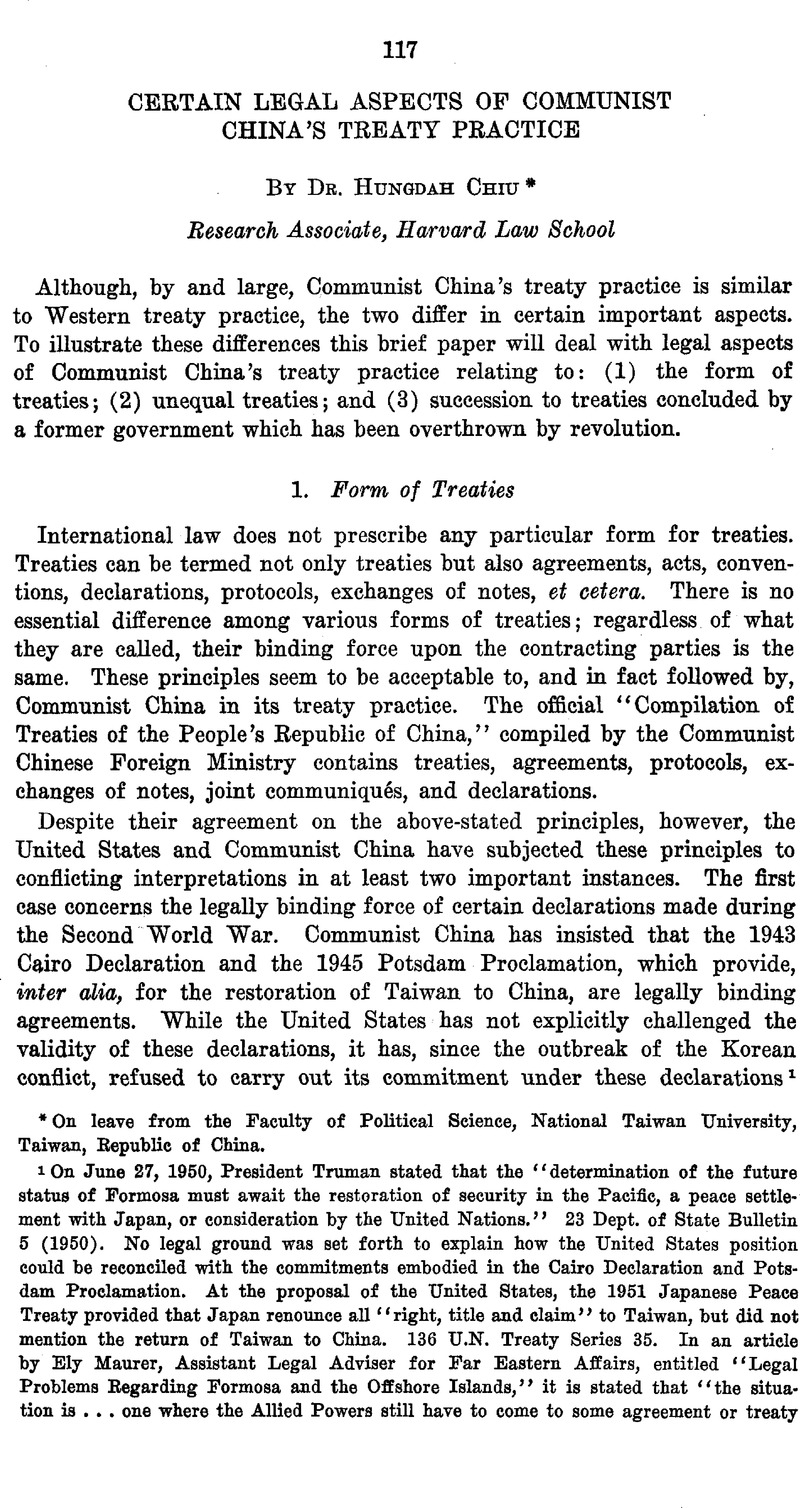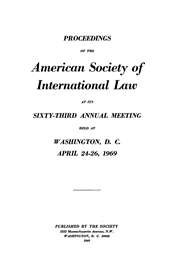Article contents
Certain Legal Aspects of Communist China's Treaty Practice
Published online by Cambridge University Press: 27 February 2017
Abstract

- Type
- Third Session
- Information
- Proceedings of the American Society of International Law at its annual meeting (1921-1969) , Volume 61 , 1967 , pp. 117 - 126
- Copyright
- Copyright © American Society of International Law 1967
References
1 On June 27, 1950, President Truman stated that the ‘ ‘ determination of the future status of Formosa must await the restoration of security in the Pacific, a peace settlement with Japan, or consideration by the United Nations.'’ 23 Dept. of State Bulletin 5 (1950). No legal ground was set forth to explain how the United States position could be reconciled with the commitments embodied in the Cairo Declaration and Potsdam Proclamation. At the proposal of the United States, the 1951 Japanese Peace Treaty provided that Japan renounce all “right, title and claim” to Taiwan, but did not mention the return of Taiwan to China. 136 U.N. Treaty Series 35. In an article by Ely Maurer, Assistant Legal Adviser for Far Eastern Affairs, entitled “Legal Problems Eegarding Formosa and the Offshore Islands,” it is stated that “the situation is … one where the Allied Powers still have to come to some agreement or treaty with respect to the status of Formosa.” 39 Dept. of State Bulletin 1005, 1009 (1958). The Bepublic of China also considers the Cairo Declaration and Potsdam Proclamation as legally binding. See President Chiang's address on the international situation, Feb. 8, 1955, 5 Free China Eeview, No. 3, at 49, 52-53 (March, 1955). For a study of the legal status of Formosa, see Morello, The International Legal Status of Formosa (The Hague, 1966).
2 The literature on this topic is voluminous. For a study of the Nationalist Chinese view, see Yu-hao Tseng, The Termination of Unequal Treaties in International Law (Shanghai, 1933). When the term “unequal treaty” first came to use in China is not clear, but it has been a popular term in China since the 1920's when Dr. Sun Yat-sen, the founder of the Chinese Bepublic, began to advocate the abolition of “unequal treaties.” The first important document on this problem seems to be the speech given by Dr. Sun entitled “Japan Should Assist China to Abolish Unequal Treaties,” delivered in Japan on November 28, 1924. 3 Huo-fu chiian-shu (complete works of Sun Yat-sen) 517 (Taipei, 1961). The term is also used in Japan. See Yokota Kisaburo, Kokusai hogaku (The Study of International Law) 135-139 (Tokyo, 1955).
3 226 U.N. Treaty Series 16. Neither the Communist Chinese official “Compilation of Treaties” nor the “Compilation of Foreign Eelations Documents” contains this agreement.
4 Decision of the Standing Committee of the National People's Congress, Dec. 23,1957, 6 Treaties 294, 313 (1957). The Communist Chinese acceptance of the Eegulations was deposited on Jan. 27, 1958, with the then depositary government—the British Government. However, the depositary function of the British Government was transferred to the IMCO on July 13, 1959, and China has been represented in the IMCO by the Nationalist Government. Thus, in a table listing states accepting the Regulations published by the IMCO in November, 1959, Communist China was not listed. See Gazette of the Legislative Yuan, 34th sess., No. 6, at 9, 15 (Dec. 1, 1964). On Nov. 21, 1966, a Nationalist Chinese acceptance of the 1948 Regulations was deposited with the IMCO. In view of this, the Communist Chinese earlier acceptance of the Eegulations appears to be invalid.
5 See 22 Dept. of State Bulletin 119 (1950). But it is not clear whether Communist China disregarded the 1943 treaty because it considered it to be an unequal treaty or for some other reason. A recent article in People's Daily criticized this treaty as an unequal treaty. See Shih Hung-ping, “Hou Wai-lu Is An Experienced Anti-Communist,” People's Daily, Nov. 11, 1966.
- 1
- Cited by




